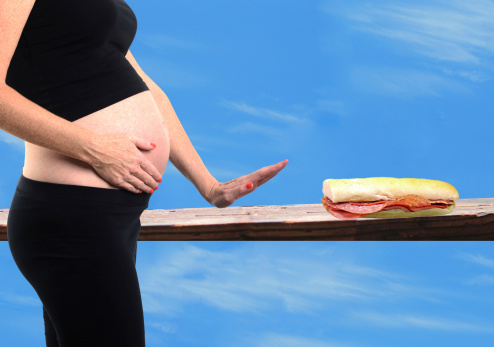Don’t Eat That!
 You get the run down of foods to avoid at your first prenatal care visit- but do you know why those foods are relegated to the “No No” list? Here are some quick hits on why you are avoiding certain dishes during pregnancy.
You get the run down of foods to avoid at your first prenatal care visit- but do you know why those foods are relegated to the “No No” list? Here are some quick hits on why you are avoiding certain dishes during pregnancy.
Seafood
The FDA and the EPA discourage eating certain fish, such as swordfish, shark, king mackerel and tilefish, while pregnant. These fish are likely to contain more mercury than others, which can harm your baby’s developing nervous system. Other fish, like salmon and tuna, are a great source of protein and omega-3 fatty acids, but keep track of the amount you eat. Canned tuna can contain mercury levels that vary from can to can.
Sushi is another controversial seafood. Raw fish can contain harmful bacteria or viruses. A rule of thumb is to cook fish until it is opaque and flaky. If you are craving sushi, look for rolls that are veggies only or contain only cooked seafood like shrimp. Beware of possible contact contamination in the kitchen though.
Soft Cheese
Cheeses such as brie, feta and bleu cheese are often unpasteurized or mold-ripened and can contain bacteria leading to a foodborne illness. Low-fat dairy is important to your pregnancy diet, so if you are using one of the listed cheeses just seek out a variety clearly labeled as “pasteurized.”
Caffeine
If you are a java fiend, your care provider will likely tell you to simply limit your intake. Caffeine in small doses is believed to be fine in pregnancy, but it can cross the placenta and affect your baby and his heart rate (plus it might impact your already difficult sleeping patterns.)
Tea and soda contain caffeine as well, so swapping out your daily coffee for tea isn’t that simple. Ask your provider for a limit in milligrams of caffeine and then start reading labels. Decaffeinated beverages still contain trace amounts of caffeine, so don’t think those drinks are completely free and clear.
Lunch Meat
Lunch meat is fine to eat during pregnancy, but straight from the package isn’t recommended. The risk of listeria bacteria is higher in prepackaged lunch meat, but a quick zap in the microwave or turn in a frying pan should render it safe to eat. Before 20 weeks, listeria could cause a miscarriage. After 20 weeks, an upset stomach or food poisoning symptoms are the most likely consequences.
When in doubt, call your care provider. Ask for links to reputable sources regarding food consumption in pregnancy, or for recipe ideas to replace items you should no longer eat.

